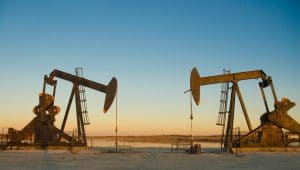Which Texas Oilfield Jobs Are the Most Dangerous?
 Oilfield work is dangerous work. Employees and contractors are at constant risk of catastrophic injuries and deaths from transportation accidents, equipment accidents – not to mention malfunctions, fires, pipeline explosions, and other causes.
Oilfield work is dangerous work. Employees and contractors are at constant risk of catastrophic injuries and deaths from transportation accidents, equipment accidents – not to mention malfunctions, fires, pipeline explosions, and other causes.
Many Texas workers who work directly at the oilfield site risk being injured by the following types of hazardous situations:
- Exposure to dangerous toxins that can cause respiratory illnesses and skin disorders.
- Getting caught in/crushed by complicated oilfield machinery that has many different moving parts, or collapses during use.
- Fires and explosions, which may be ignited by cutting torches, static electricity, or other energy sources.
- Falls from platforms and machinery, as well as from site vehicles.
According to Rocky Mountain Industrial Supply, workers who work in confined spaces have a risk of exposure to hazardous fumes because the gases and chemicals are often colorless and odorless. Properly calibrated gas monitoring of the equipment is essential.
There are many different types of oilfield jobs, each with its own set of dangers. Work is currently available at many Texas locations, including the Permian Basin, Eagle Ford Shale, the East Texas Oil Field, the Yates Oil Field, the Sprayberry Oil Field, and other locations across Texas.
What types of injuries do Texas oilfield workers suffer?
Oilfield accidents often cause catastrophic injuries that require surgeries and extensive rehabilitation just to give the victim a chance at some type of quality life. Most victims who have catastrophic injuries require a lifetime of medical care. Many can never work again, and if they can go back to work, they can no longer do the same type of job they did before the accident. Oilfield accident victims often live with long-term psychological scars in addition to their physical pain.
Our Texas oilfield injury lawyers represent victims who suffer:
- Traumatic brain injuries
- Severe burn injuries
- Amputation of a limb or an appendage
- Spinal cord damage/ paralysis
- Internal organ damage
- Loss of sight of sound
- Multiple broken and/or crushed bones
The most dangerous oilfield jobs
There are a lot of dangerous jobs in the oil industry, but some pose greater risks than others. The most dangerous oilfield jobs include:
- Oil field truck driver. Truckers transport oil from one location to another. Truck accidents happen for many reasons including blind spots, difficulty controlling the trucks, and other causes. Some of the reasons driving oil trucks is dangerous and deadly are that many drivers are forced to use unsafe rural roads, and some drivers drive while they are tired because oilfield workers often work long hours. Oil field trucks can be difficult to operate because the oil shifts around while the driver is traveling. A unique danger is that oil is flammable which means that if a truck accident does occur, there is a good chance of a fire or an explosion.
- Roustabouts. These workers usually are the least experienced workers. Many have minimal training. Their tasks include equipment maintenance, oil spill cleanup, moving pipelines, and operating heavy machinery. Roustabouts risk injuries from slip and fall accidents, being struck by moving equipment and debris, and exposure to dangerous chemicals. Many roustabouts suffer injuries due to the fatigue of working long hours.
- Drillers. Drillers operate the drilling platform and handle the drilling process. They also monitor gas levels. Some of the dangers of working as an oilfield driller include falls, exposure to dangerous chemicals, and explosions.
- Derrick hand. A derrick hand is an entry-level job. Among other duties, the derrick hand helps move and lift heavy equipment, which creates a risk of being crushed by the equipment or falling. One of the primary duties of the derrick hand is to help with the insertion of pipes into the well. Derrick hands often work high off the drilling platform – which makes the risk of a deadly or serious fall very likely. Head trauma, spinal cord damage, and broken bones, and death are very likely results of falls, if the worker is lucky enough to survive.
- The roughneck performs a lot of manual labor including connecting pipes down the wellbore. A roughneck works on the floor of the oil rig and also works with heavy machinery and equipment. The risks of injuries include being crushed or pinned by the equipment, falls, accidents due to fatigue, and burns from explosions or fires.
What types of injury claims can oilfield workers file?
Workers who are injured while working in an oilfield can file personal injury claims, product liability claims, and workers’ compensation claims, depending on how the accident happened and their work status.
- Personal injury claims. This claim requires showing that the oilfield company or some other responsible person or company is responsible for the worker’s injuries. Victims can seek compensation for their medical bills, lost income, pain and suffering, and scarring and disfigurement.
- Product liability claims. These claims are filed when a manufacturer makes defective equipment, and the defect causes an accident which results in injuries or death. Damages are similar to personal injury damages.
- Workers’ compensation claims. Employees can file for work injury benefits. These benefits include medical expenses, temporary disability benefits, and permanent disability benefits.
The families of deceased workers can file wrongful death actions on behalf of their loved ones.
At Slack Davis Sanger, our Texas oil field injury and fatality lawyers have more than 200 years’ combined experience. We work with oilfield industry experts who understand the federal laws, state laws, and industry standards for oilfield work. We work aggressively to obtain all the compensation you deserve. While many cases do settle, we are always ready to try your case before a jury. To speak with an experienced Texas injury lawyer, please call 800-455-8686 or fill out our contact form. We maintain offices in Austin, Dallas, and Fort Worth for your convenience.

The firm handles cases involving catastrophic personal injuries and deaths. Our work spans three decades of handling airplane and helicopter crashes, truck and car accidents, oilfield and construction accidents, and other devastating accidents. We try lawsuits throughout the country in both federal and state courts and have recovered hundreds of millions of dollars for our clients. To date, we have handled or tried cases in 47 states, read more about our attorneys and firm.
